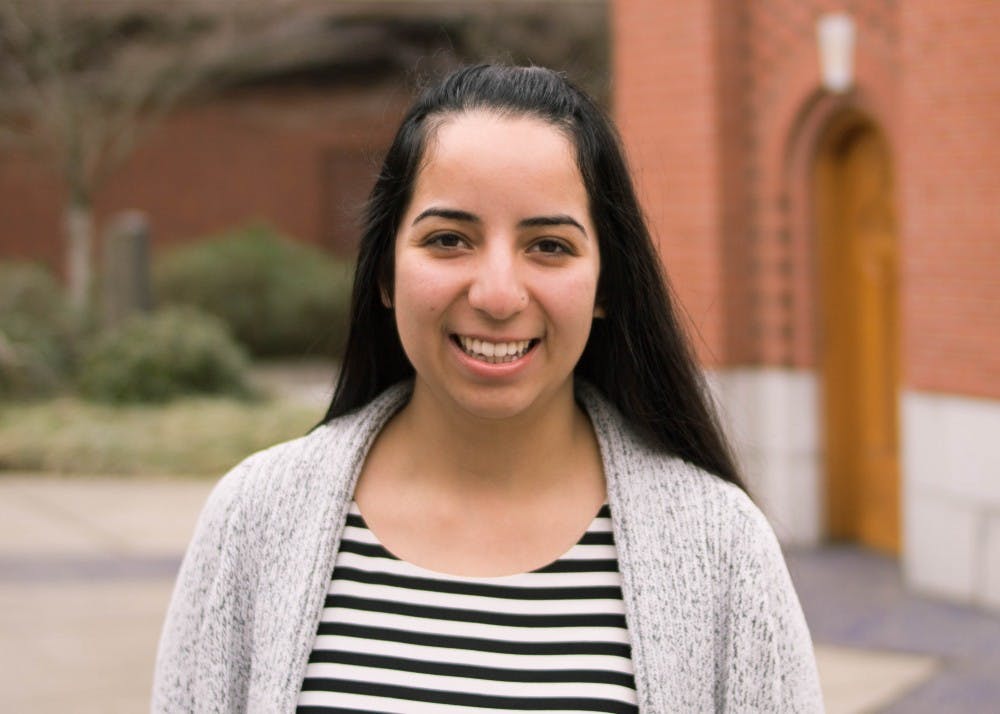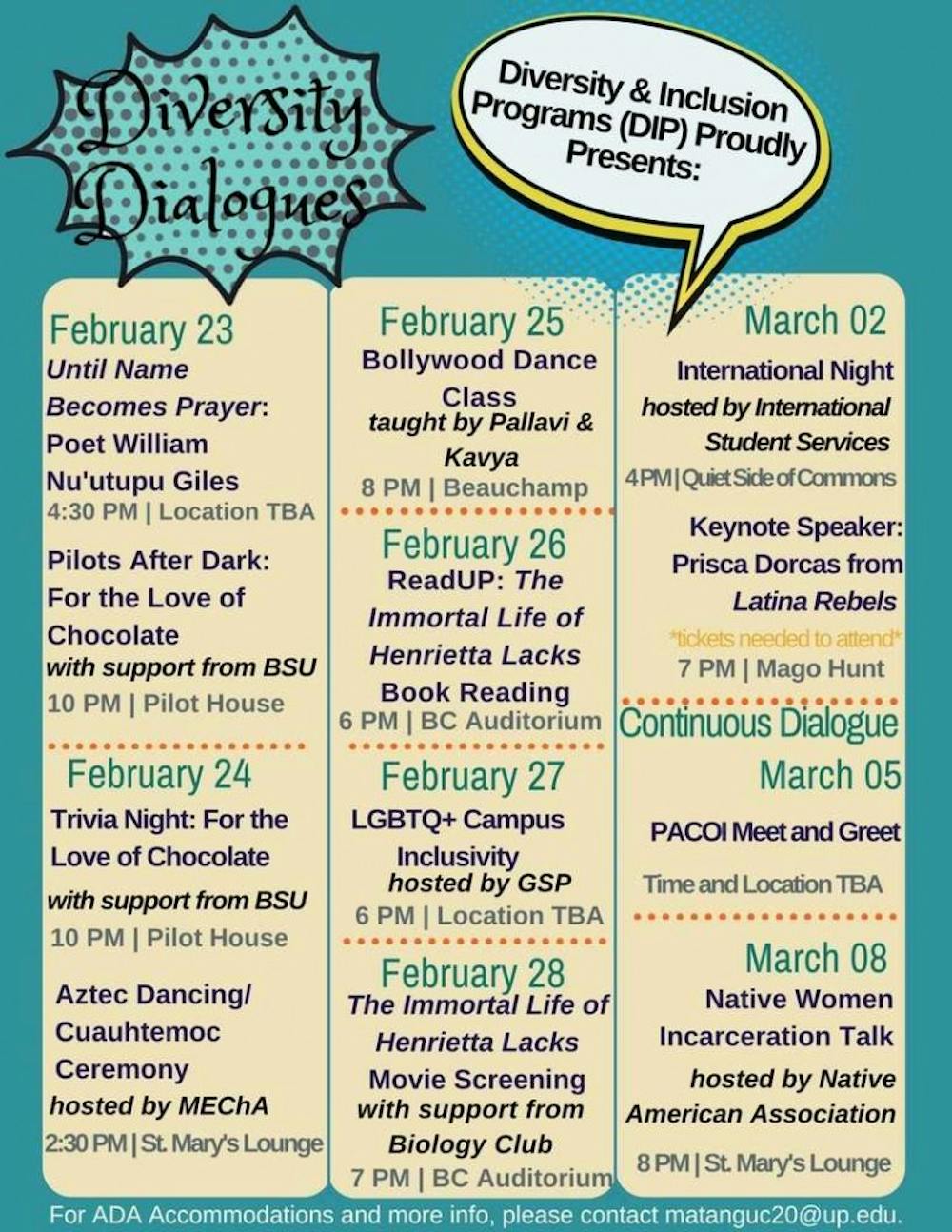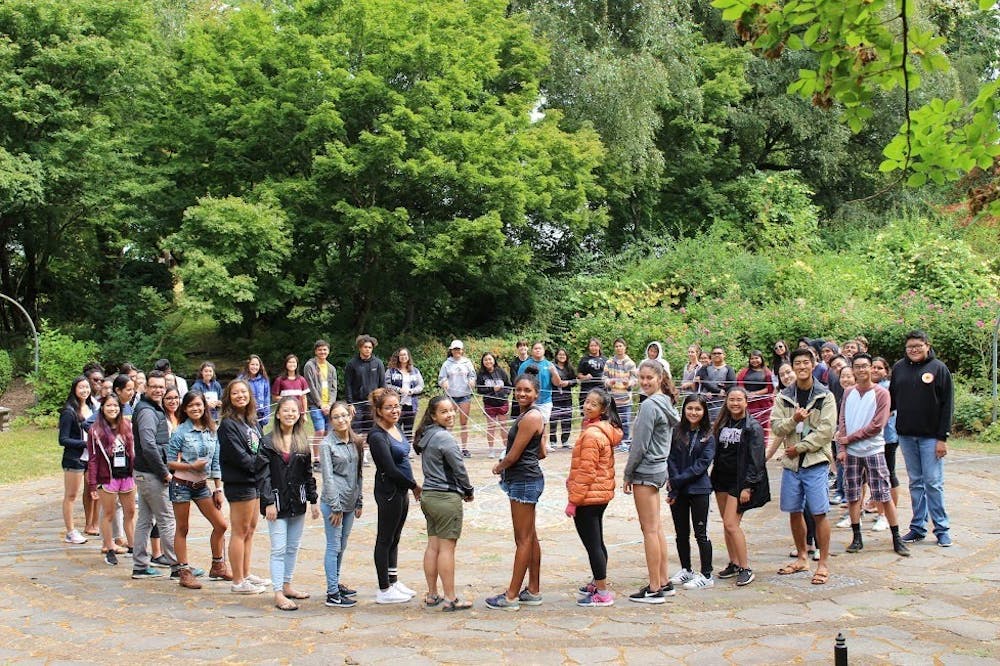When she opened her admissions packet before attending the University of Portland and saw the Ohana brochure inside, senior Miranda Whitters was immediately interested in the program. But the title “Ohana,” which is the Hawaiian word for family, made her feel hesitant to join as a native of Seattle, Washington.
As she kept reading the program’s description, Whitters realized that she was actually eligible for the program. Ohana is a program for freshman students to help establish a community between students of diverse backgrounds, although students from any ethnic background are welcome to join. Whitters joined Ohana and has moved from being a participant during her freshman year to a student mentor in her sophomore and junior years. In her final year, Whitters became the student coordinator.
The name “Ohana” for the program can often mislead incoming students into thinking that Ohana is solely for students from Hawaii. Yuri Hernández Osorio ('15), UP’s new campus Diversity and Inclusion Program coordinator, noticed the problem with using the name Ohana and plans to restructure and rebrand the Ohana program this year.
“Language is really important,” Hernández Osorio said. “When you participate in Ohana, you know that it’s a sense of family and that we’re all connected, but when you just read (the name) Ohana alone, you get the narrative that it’s not meant for other students.”
Hernández Osorio is new, but she has big plans for the Diversity and Inclusion Program. She is making long-awaited changes by renaming and restructuring events and programs such as Ohana and Diversity Dialogues Week. Hernández Osorio has a three-year plan to grow Ohana, first by changing the program’s name. She also plans to restructure the annual Diversity Dialogues Week by eliminating the word “week” and creating continuous dialogue by expanding programming.
“When I got this position, I looked at Diversity Dialogues more critically and the first change that I made was just dropping the language of the ‘week,’” Hernández Osorio said. “That’s intentional because it’s important that we talk about diversity and inclusion all the time in everything we do, and it should be embedded in every aspect of our mission and vision.”

Then OHANA, now UP Connections
The name UP Connections has been around for as long as the Ohana program. But not many students know that Ohana and UP Connections are essentially the same program.
Ohana is a week-long retreat-like experience in the Menucha Center by the Columbia River Gorge. The program is for incoming students from multicultural backgrounds to connect with other students. When the school year begins, Ohana turns into UP Connections, where any student who did not get a chance to participate in the retreat during the pre-orientation can have a chance to join a mentorship program.
“As a student mentor, our job is to connect students to other resources on campus and offer them ways to get involved in the community as freshmen,” said junior psychology major Elaika Celemen. “We help them with the transition process from high school to college.”
Ohana was established in 2004 to help UP retain students from Hawaii, according to Matthew Deschner, senior assistant director of admissions. At the time, the amount of incoming students from Hawaii was increasing. Now, the population of students from other regions is also increasing. With diversity pouring in outside of the Pacific Islands, Hernández Osorio decided that Ohana was no longer an applicable title.
After several discussions with student alumni, leaders and diversity coordinators about a name change, Hernández Osorio decided to retitle the pre-orientation retreat to UP Connections, in line with the mentorship experience.
“It makes sense now to include more students for our future generation who may be coming from California, Arizona or Guam, and create an environment that’s appropriate for the time we are in,” said Deschner. “Ohana was appropriate back in the day, and UP Connections is appropriate now.”
Deschner also said that the rebranding shows the importance of the Pacific Islands to the university, and exhibits a reflection of the growing population of students from diverse backgrounds.
“We can still honor or celebrate Ohana, and it’s not to dismiss any of the work accomplished from Ohana, but it just means our needs have grown,” Hernández Osorio said. “Programs are meant to grow and continue to evolve, so we decided that the name needs to match its growth.”
This school year, UP Connections had a record number of students coming from diverse backgrounds. Hernández Osorio said that the current cohort was the most diverse the program has seen in years.
“It’s a great idea to change the name, because all of our past participants thought that Ohana felt strictly for Hawaii or the Pacific Islands,” said junior nursing major and student mentor Isabella Garcia.
One of the immediate changes that Hernández Osorio is making is to the mentorship feature of the program. Previously, student mentors and mentees were matched based on their majors, but since other groups (i.e. home-based groups, nursing mentorship program, etc.) are doing the same thing, Hernández Osorio wants to change the criteria based on the student’s identity.
“As the mentee, they will have to self-identify themselves whether they want a mentor that matches their race and ethnic identities, first-generation experience, somebody from their state or region or if they have other identities they want to match with,” Hernández Osorio said. “The mentee will have full control over what they prioritize as the mentor.”
In the next three years, Hernández Osorio said she hopes to grow the program based on participation, mentorship, retreat location and more. She also said that she wants to increase participation and involvement from faculty of color.
Casandra Esparza, admissions counselor of diversity and inclusion, also worked to expand the program by promoting UP Connections by recruiting students from diverse regions and developing a new partnership with the Davis New Mexico Scholarship Program.
“I’m happy with the name change,” Esparza said. “Ohana ends with UP Connections, and it has become a little bit of a mystery of how the program works or what that shift is, so I think it’s a great tool to be able to show (incoming students) when making the decision to come here.”
Diversity Dialogues
Diversity Dialogues Week is a week-long event aimed at educating students about diversity and inclusion on campus. Various cultural clubs and organizations participate.
Through omitting the “week” from Diversity Dialogues Week, Hernández Osorio said she hopes to emphasize the importance of an ongoing conversation about diversity and inclusion every day, not just one week out of the year.
“Looking at a continuous dialogue, it allows for more flexibility in the programming for club and student leaders,” Hernández Osorio said. “With the week-long (event), there’s the restraint of starting on this day and ending on this day, while clubs feel like they need to scramble or feel the pressure to put on programming which turns out to not be enriching to the campus.”

Courtesy of Diversity & Inclusion Programs. *Note: This is a tentative schedule. Final locations and events will be released soon.
Diversity Dialogues officially kicks off during Pilots After Dark on Feb. 23 in collaboration with the Black Student Union to honor Black History Month featuring a poetry slam called “For the Love of Chocolate.”
Spring semester is also a big time of the year for most multicultural clubs: Hawaii Club hosts its annual Lu’au. Guam Club hosts its annual Guam Night. Filipino-American Student Association hosts its annual Filipino Cultural Night and, just last year, the Vietnamese Student Association launched its first-ever cultural night as well. By dropping the word “week,” Diversity Dialogues can include these cultural nights.
“I always like to look at the national scope such as what other campuses or institutions are doing,” Hernández Osorio said. “Most of them have year-long programming around continuous dialogues and I’m always striving to improve our program by bringing those ideas to campus.”
This year’s main event in the Diversity Dialogues programming is keynote speaker Prisca Dorcas, the creator of a social media platform called Latina Rebels. Dorcas will speak during International Night on March 2.
Traditionally, International Night marks the end of Diversity Dialogues, but this year Diversity Dialogues is intended to highlight an ongoing conversation of diversity and inclusion on campus.
“When we talk about the University of Portland, yes, we are a predominantly white institution, but we are doing all these things and providing all of these programs and events for students to be involved in,” Esparza said. “It’s important for our students to come here, see what our vision is and find the space and people who are are going to be resources for them.”
Whitters as well as the student diversity coordinators and club leaders are excited about the changes being made in the Diversity and Inclusion Programs.
“Overall, I would like to see communities that aren’t directly impacted by the issues to turn out,” Hernández Osorio said. “This is a great opportunity to have a conversation, be involved in cultural exchange and be exposed to different train of thoughts, different lenses or walks of life.”









